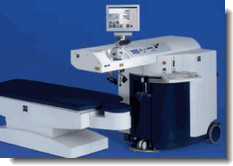
Meditec Mel 80 Excimer Laser: FDA Test Results
Device Trade Name: MEL 80 Excimer Laser System
Applicant: Carl Zeiss Meditec Inc, Dublin, California, USA.
Approved By The FDA: August 15, 2006
Applicant: Carl Zeiss Meditec Inc, Dublin, California, USA.
Approved By The FDA: August 15, 2006
The Carl Zeiss Meditec MEL 80 Excimer Laser System has been marketed in the following countries: Australia, Austria, Belgium, Canada, Czech Republic, China, Croatia, Denmark, Egypt, Estonia, Finland, France, Germany, India, Iran, Italy, Japan, Kazakhstan, Kuwait, Latvia, Libya, Lithuania, Malaysia, Morocco, Mexico, Netherlands, Oman, Palestine, Portugal, Russia, South Africa, Slovenia, Spain, Switzerland, Thailand, Turkey, United Arab Emirates, and the United Kingdom. The Carl Zeiss Meditec MEL 80 Excimer Laser System has not been withdrawn from marketing for any reason relating to the safety and effectiveness of the device.
The Carl Zeiss Meditec MEL 80 Excimer Laser System is indicated for use in primary Laser Assisted In Situ Keratomileusis (LASIK) for:
*For the reduction or elimination of myopia of less than or equal to -7.0 D with or without refractive astigmatism of less than or equal to -3.0 D;
*In subjects with documentation of stable manifest refraction over the prior year;
*In subjects who are 21 years of age or older.
*For the reduction or elimination of myopia of less than or equal to -7.0 D with or without refractive astigmatism of less than or equal to -3.0 D;
*In subjects with documentation of stable manifest refraction over the prior year;
*In subjects who are 21 years of age or older.
Summary Of Clinical Studies:
A total of 360 eyes were enrolled in this study. Effectiveness results are provided for 354 eyes with at least six months of follow-up data. Safety data are provided for all 360 eyes enrolled in the study.
A. Study Objective
The objectives of this study was to evaluate the safety and effectiveness of the Meditec MEL 80 Excimer Laser System for the reduction or elimination of myopia of less than or equal to -10.00 D, and astigmatism less than or equal to -3.50 D at the spectacle plane, when used as part of the LASIK surgical procedure.
A total of 360 eyes were enrolled in this study. Effectiveness results are provided for 354 eyes with at least six months of follow-up data. Safety data are provided for all 360 eyes enrolled in the study.
A. Study Objective
The objectives of this study was to evaluate the safety and effectiveness of the Meditec MEL 80 Excimer Laser System for the reduction or elimination of myopia of less than or equal to -10.00 D, and astigmatism less than or equal to -3.50 D at the spectacle plane, when used as part of the LASIK surgical procedure.
| Patient Symptoms: | % Worse At 3 Months: | % Worse At 6 Months: |
| Light Sensitivity | 16.6% | 13.9% |
| Headaches | 6.2% | 5.4% |
| Pain/Burning | 5.3% | 4.3% |
| Dryness | 40.7% | 27.6% |
| Excessive Tearing | 2.2% | 1.7% |
| Gritty, Scratchy | 10.7% | 7.4% |
| Glare | 21.1% | 16.8% |
| Halos | 24.4% | 16.8% |
| Blurred Vision | 17.4% | 13.9% |
| Double Vision | 9.0% | 4.5% |
| Fluctuation Of Vision | 19.9% | 16.2% |
| Variation-Bright Light | 8.7% | 10.5% |
| Variation-Normal Light | 7.3% | 7.4% |
| Variation-Dim Light | 17.1% | 15.3% |
| Night Driving Vision | 21.1% | 15.1% |
Patient Satisfaction:
Responses provided by the study participants at three and six months to three questions regarding their experiences with the laser surgery are provided at right. These three questions related to: 1) the perceived overall quality of vision following surgery; 2) the participant's willingness to have the surgery again if he/she could make the choice over; and 3) the participant's overall satisfaction with the results of the surgical procedure.
Responses provided by the study participants at three and six months to three questions regarding their experiences with the laser surgery are provided at right. These three questions related to: 1) the perceived overall quality of vision following surgery; 2) the participant's willingness to have the surgery again if he/she could make the choice over; and 3) the participant's overall satisfaction with the results of the surgical procedure.
Self Evaluation: |
Overall Vision Quality: |
| Would Select Refractive Surgery Again: |
Satisfaction: |
Response: |
At 3 Months: |
At 6 Months: |
| No Improvement | 0.6% | 0.6% |
| Slight Improvement | 1.1% |
0% |
| Moderate Improvement | 1.1% |
1.7% |
| Marked Improvement | 14.4% |
16.3% |
| Extreme Improvement | 82.8% |
81.5% |
| No | 1.1% | 2.2% |
| Yes | 94.4% | 94.4% |
| Unsure | 4.4% | 3.4% |
| Very Satisfied | 90.6% | 88.8% |
| Moderately Satisfied | 7.8% | 8.4% |
| Neutral | 0.6% | 1.7% |
| Dissatisfied | 1.1% | 0.6% |
| Very Dissatisfied | 0.0% | 0.6% |
At three months, the overall quality of vision was rated highly, with 99.4% of patients indicating that there was an improvement, while only 0.6% indicated that there was no improvement; 94.4% would elect to have the surgery again; 98.3% reported being satisfied, while 0.6% were neutral and 1.1% were dissatisfied.
Conclusions Drawn From The Clinical Study:
The data in this application provides reasonable assurance that the device is safe and effective when used in accordance with the directions for use. The FDA issued its approval of the Meditec MEL 80 Excimer Laser System on August 15, 2006.
The data in this application provides reasonable assurance that the device is safe and effective when used in accordance with the directions for use. The FDA issued its approval of the Meditec MEL 80 Excimer Laser System on August 15, 2006.

B. Study Design
This was a prospective, multicenter clinical trial in which a total of 360 eyes of consecutive patients at four clinical sites were enrolled, treated with the MEL 80 Excimer Laser, and followed for a six month period. The pre-treatment condition of the eye was considered the control state for most comparisons.
This was a prospective, multicenter clinical trial in which a total of 360 eyes of consecutive patients at four clinical sites were enrolled, treated with the MEL 80 Excimer Laser, and followed for a six month period. The pre-treatment condition of the eye was considered the control state for most comparisons.
Results Of The Study:
Adverse events and complications that occurred in the clinical study are shown below:
Adverse events and complications that occurred in the clinical study are shown below:
Demographics:
The demographics for this study are typical for a contemporary refractive surgery trial performed in the U.S. Of the 182 enrolled subjects, 55.5% were male, and 44.5% were female. Caucasians made up 79.7% of the study participants, Blacks 3.3%, Asian 4.9%, Other 12.1%. Ages ranged from 21-60 years, with the mean age at 33.5 years.
The demographics for this study are typical for a contemporary refractive surgery trial performed in the U.S. Of the 182 enrolled subjects, 55.5% were male, and 44.5% were female. Caucasians made up 79.7% of the study participants, Blacks 3.3%, Asian 4.9%, Other 12.1%. Ages ranged from 21-60 years, with the mean age at 33.5 years.

More On Laser Eye Surgery:
Contact Lenses | Glaucoma | Just For Fun | Eyeglasses | Eye Doctor | Eye Care And Symptoms | Eye Anatomy | Online Eye Tests | Laser Eye Surgery | Laser Eye Surgery Directory: Canada | Laser Eye Surgery Directory: USA | Laser Eye Surgery Reviews | Submit A Review | Contact Us | Privacy Policy | Sitemap
Copyright 2006-2009 Vision Health

